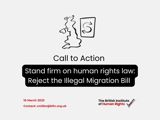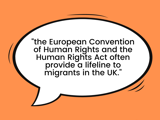Article 2 issues may arise when staff do not follow proper procedures to protect people’s right to life when they’re in immigration detention.
Carlington Spencer died of a stroke while in immigration detention. His friends noticed symptoms, such as slurring, dribbling and collapsing on the floor, and told staff they were worried. However, staff were dismissive and did not check for a stroke because they assumed that he had taken a drug known as “spice” (although they had not found any evidence to suggest this). They recorded the symptoms in an “illicit substances” log but did not review Carlington’s wellbeing before closing it. The next day Carlington was worse and his friends set off emergency alarms. Staff called a “non-emergency” ambulance which did not arrive for another hour. Carlington died three days after and courts found that staff failure contributed to his death.



